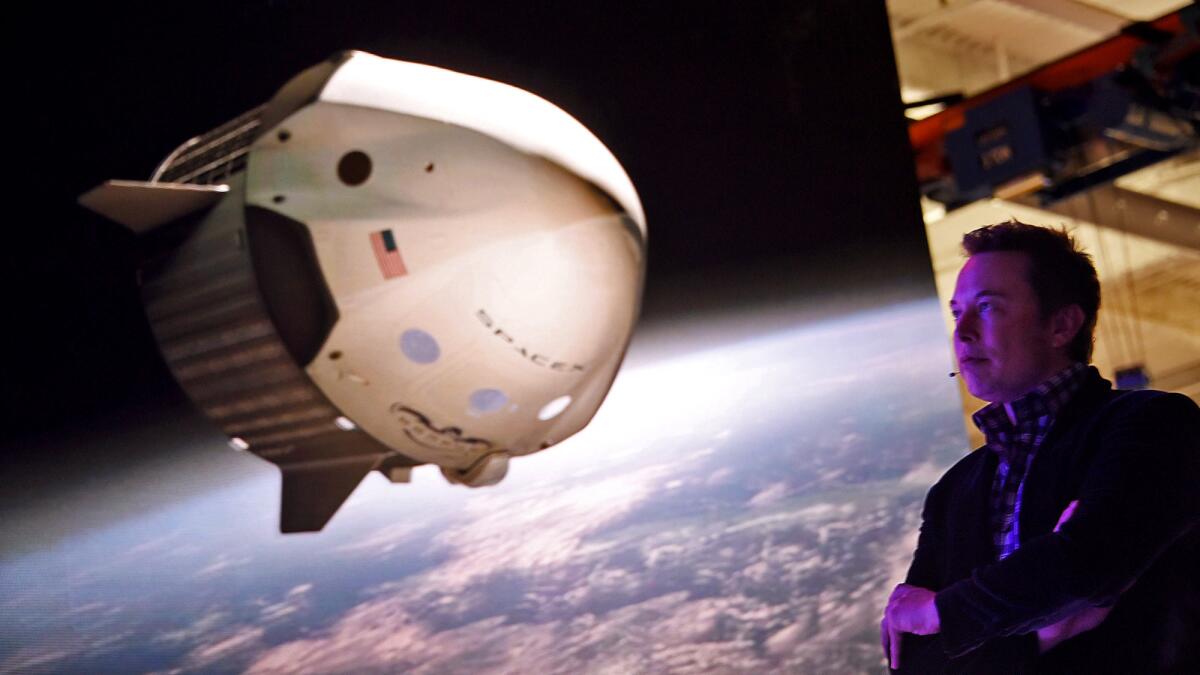How politics could disrupt the SpaceX rocket revolution

SpaceX CEO Elon Musk watches a video animation of SpaceX’s Dragon V2 spacecraft at a news conference to introduce the manned space capsule in Hawthorne in 2014.
Landing rocket boosters on an open-ocean platform has been a massive engineering hurdle for SpaceX.
Politics are proving to be a different sort of challenge.
As competition in the satellite-launch sector intensifies, the battle between traditional aerospace giants and upstart companies backed by tech billionaires Elon Musk, Jeff Bezos and Richard Branson is increasingly shifting to Congress.
Both sides have boosted their spending on Washington lobbying and are marshaling support from legislators, especially those whose districts contain rocket facilities.
Last month, as part of its markup of the National Defense Authorization Act, the House Committee on Armed Services called for a study on how a government sale of excess intercontinental ballistic missiles would reshape the commercial-satellite launch business. Emerging small-satellite launch outfits say that change in policy could destroy their burgeoning industry.
The committee also approved a hotly debated amendment to that same bill that would allow for additional purchases of Russian rocket engines. The move was pitched by proponents as a way to guard against a potential SpaceX monopoly on national security launches, giving the current launch consortium -- itself a monopoly until recently -- time to transition to an American replacement engine.
“Traditional launch providers see their market being threatened by nontraditional entrants,” said Loren Thompson, aerospace analyst with the Lexington Institute, an Arlington, Va., think tank. “Basically, this is competition between launch providers over market share and money that in the political process gets related to local interests.”
In 2015, United Launch Alliance spent $1.4 million on lobbying, up from $1 million the year before, according to the nonpartisan Center for Responsive Politics, which tracks federal campaign contributions and lobbying efforts on its website opensecrets.org.
That same year, SpaceX spent $1.7 million on lobbying, up from $1.5 million in 2014.
The move away from the Russian RD-180 as the launch engine for Pentagon surveillance satellites has proven to be a flashpoint for rocket politics, pitting Hawthorne-based SpaceX against ULA, a joint venture of Boeing Co. and Lockheed Martin Corp.
The RD-180 powers ULA’s Atlas V launch vehicle, which is used to blast military satellites into orbit. The U.S. has used Russian rocket engines for government and commercial launches since 2000. That decision was a product of post-Cold War cooperation between U.S. businesses and the Russian defense industry, which Washington also saw as a way to head off proliferation of Russian missile technology.
Congress limited the use of the engines in 2014, however, after Russia annexed Crimea, and it has called for the development of an American-made alternative by 2019.
That opened the door for new space companies. Leveraging private business models that allow for more experimentation without fear of alienating shareholders, upstarts such as Bezos’ Blue Origin and Musk’s SpaceX have upended the existing launch market.
SpaceX already boasts lower launch costs than its traditional competitors -- the starting price to launch the company’s Falcon 9 rocket is $62 million, while a former ULA executive said earlier this year that at its best, the joint venture will bid at $125 million.
If Musk succeeds in making his first-stage rockets routinely reusable -- as demonstrated in two straight landings on a “droneship” -- SpaceX could drop its prices as much as an additional 30%.
Those low costs already have forced established competitors to fight back on a number of fronts.
ULA is developing the new, cheaper Vulcan rocket, which will be powered by an engine built by Blue Origin, the space company started by Amazon founder Bezos, and is intended for the national security launch market.
That BE-4 engine will run on liquid oxygen and liquefied natural gas. That new technology could be cheaper, analysts say, though potentially more risky than a more conventional engine option being developed for ULA by Sacramento manufacturer Aerojet Rocketdyne.
ULA could continue to compete with SpaceX if it is allowed to increase its purchase of Russian rockets, from nine to as many as 18, as proposed in the defense-bill amendment approved by the House committee late last month. The amendment was sponsored by Rep. Mike Coffman (R-Colo.), whose congressional district includes ULA’s headquarters.
During the bill markup, Coffman said a “hasty” prohibition on Russian rocket engines would harm national security, launch competition and raise concerns about fiscal responsibility.
“The Air Force has asked for 18 Russian-made engines to ensure a safe, practical and responsible transition away from RD-180 powered Atlas V rocket, and that is exactly what my amendment does,” he said. “Ending our reliance on Russian engines is clearly in the national security interest of the United States, but not at the expense of the paramount requirement of assured access for national security missions.”
SpaceX backers came close to blocking the Russian rocket amendment, according to Politico, citing unnamed sources. The website described a scene where Rep. Duncan Hunter (R-Alpine), whose district is just south of SpaceX’s headquarters, was waiting for Rep. Devin Nunes (R-Tulare) and the Intelligence Committee to sign off on a waiver that would have countered the amendment. But, Politico reports, the waiver never came.
SpaceX, meanwhile, has benefited from eagerness to cut ties with the newly assertive Russians.
Hunter noted that Musk’s company saved the Air Force money on a recent satellite launch.
“Guess what it cost them? $82 million,” he said. “The same launch from ULA cost $200 million. There’s no reason for us to line Putin’s pockets right now.”
Another battleground is shaping up in commercial satellite launch, where Orbital ATK -- a Dulles, Va., company formed by the merger of two legacy aerospace outfits -- is pushing for clearance to use low-cost former intercontinental ballistic missiles, or ICBMs.
Those ICBMs were originally intended to launch nuclear warheads thousands of miles, but as the U.S. and Russia negotiated smaller missile forces, the rockets were taken out of service.
Orbital ATK wants the government to sell the decommissioned missile motors, arguing that it would allow that company and others to better compete with cheaper international rivals that launch small satellites weighing 1,100 to 4,400 pounds.
Orbital ATK currently uses decommissioned ICBM motors in its Minotaur launch vehicles, but only for blasting government payloads into orbit. The U.S. has not allowed excess ICBMs or their components to be used for commercial launch services since 1998.
“The commercial market in that class payload is very vibrant,” said Mark Pieczynski, vice president of business development at Orbital ATK. “We look at that and say, ‘Well, we’ve got a perfectly good rocket that can launch from U.S. soil, but it’s not because it can’t compete commercially. So we’re sending that business to Russia, we’re sending that business to India.’”
But critics of the plan contend that government sales of the cheap missile motors could damage the dozen or more small-satellite launch companies that have cropped up. Virgin Galactic, founded by British billionaire Branson, is currently building LauncherOne, a launch vehicle designed to blast small satellites weighing less than 1,102 pounds into orbit.
These companies have said they cannot use the solid-fuel rocket motors in their launch vehicles and that the Minotaur’s larger size means it could “piggyback” a number of smaller satellites onto the already cheaper rockets, driving down launch costs.
Pieczynski said Orbital ATK is focused on dedicated payloads for the Minotaur and that SpaceX’s Falcon 9 rocket and ULA’s Atlas V already load up a variety of satellites.
“We have no intention of diminishing any of their market share,” he said of the smaller companies. “We’re dealing in completely separate markets.”
But Space Angels Network, a New York City-based investor in early-stage space companies, sent a letter to the Senate last month saying that a reversal of the policy could disrupt “strong positive momentum” in the market and increase investor uncertainty.
“It could have a big impact on a lot of the small commercial launch companies that have invested a lot of private investment capital and a lot of innovation,” said Eric Stallmer, president of the Commercial Spaceflight Federation trade group, which opposes changing the missile-use policy.
ALSO
California’s use of coal drops dramatically — to almost nothing
Watch a conservative blame government waste on the little guy
SuperShuttle sues California to classify workers as contractors instead of employees
For more business news, follow me @smasunaga
More to Read
Inside the business of entertainment
The Wide Shot brings you news, analysis and insights on everything from streaming wars to production — and what it all means for the future.
You may occasionally receive promotional content from the Los Angeles Times.











